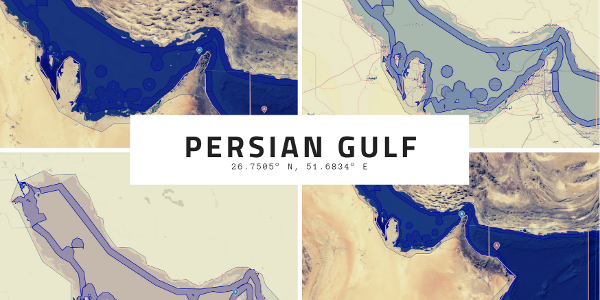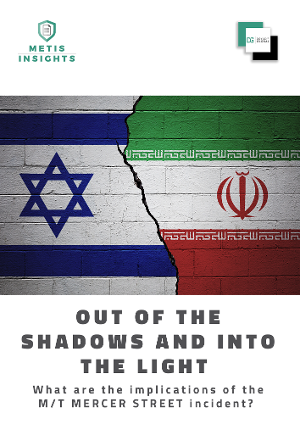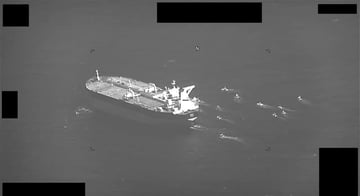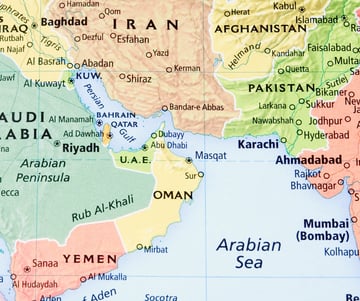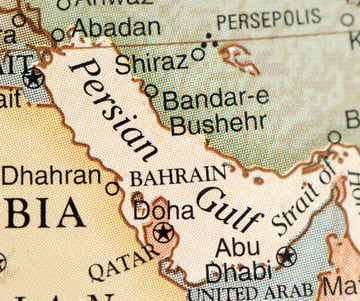Persian Gulf
Straits of Hormuz and Gulf of Oman
Free Download
Weekly Maritime Threat Assessment
The security tool for the maritime professional
Significance
The Strait of Hormuz is a narrow 21 mile wide channel separating Iran from the Arabia Peninsula. It is used to transport a fifth of the world's petroleum liquids which is around 21 million barrels or $1.2 billion worth of oil every day. The majority of Saudi Arabia's crude exports pass through the Strait of Hormuz, meaning much of the oil-dependent economy's wealth is situated there, similarly, 10% of the US's total oil imports per month transit the straits. Further, a quarter of the world’s LNG is also transported through the channel. This makes the Strait of Hormuz not only the world’s busiest shipping lane but also the most strategically important choke-point for the world's oil supply because there are limited alternatives to bypass the strait.
Security Context
The principal security implications for the region are presented by Iran. Iran’s options to address the threats it is facing to regime stability are limited, and the potential success of any response is no longer clear. Whilst this analytical perspective may appear muddled, it lends credence to the complexity of the issues. When nation states find themselves with no clear route to achieving their interests it is usually when they are at their most dangerous, and it is increasingly clear that the international community needs to acknowledge that Iran is on the precipice of an existential crisis. Whilst it is unlikely that the current instability of the Iranian regime will dramatically alter the regional maritime security picture in the near term, there is the potential for escalation should the international community not manage the situation sensitively.
Regional security in the Persian Gulf
Understanding the current issues facing Iran is vital to understanding the regional security picture. In early 2020, Iran faced three simultaneous threats to its stability in the short-term. The first, COVID-19, impacted Iran more significantly than other nations in the Middle East. The World Health Organization's statistics reported 321k confirmed cases and 17.5k deaths (as at 3rd August 2020) in stark contrast to much reduced figures reported by Iran. Whatever the true number, it was reasonable to say that Iranian society faced significant strain under the pressure of COVID-19.
The second crisis Iran faces is the ongoing punitive economic impact of US sanctions. The effect of sanctions imposed on Iran prompted 24 senior diplomats and defense officials to urge President Trump to relax sanctions. In particular, sanctions on medical and humanitarian sectors which are constraining Iran’s capacity to respond to COVID-19. The impact of sanctions is already forcing Iran to make compromises, and Iran has recently suggested some restricted economic activities may have to resume, despite the threat of COVID-19.
Lastly, the recent collapse in oil prices seriously impacted Iran and further constrained its economic options. Although Iranian export options are severely limited due to sanctions, Iran has thus far reduced the severity of the economic impact through its exports to China and Venezuela. However, with Brent crude oil prices remaining below USD $35 pb, the logic of retaining Iran as an illegitimate supplier is less clear.
Could Iran block the Strait of Hormuz?
Whenever global tensions rise in relation to Iran, media commentators drag out the scaremongering assertion that Iran could exact its revenge on the US and its allies is by shutting or harassing tankers in the Strait of Hormuz, which would disrupt oil supply and send prices shooting up.
Iranian leaders, who have also vowed retaliation for the death of Soleimani, have threatened to close down the strait multiple times in the past.
If Iran followed through with these threats, it would likely cause huge disruption to the global oil trade. As the strait is so narrow, any sort of interference in tanker traffic could decrease the world's oil supply, and send prices shooting up.
To close down the entire strait, Iran would have to place at least 1,000 mines with submarines and surface craft along the chokepoint, security researcher Caitlin Talmadge posited in a 2009 MIT study. Such an effort could take weeks, the study added.
Disrupting oil traffic on the strait would also result in oil importers around the world looking beyond the Middle East for their sources, and further reduce reliance on the region.
Iran's oil industry is already suffering after the US imposed sanctions designed to stop countries from importing Iranian oil earlier this year.
As Michael Knights, a Middle East expert at the Washington Institute think tank, told The Atlantic last May: "They'd be cutting their own throat if they close the strait."
This is true, Iran could seek to conduct maritime attacks as a route to raising oil prices; however, Dryad continues to assess that Iran does not possess the capacity or resolve to close the Strait of Hormuz. The increased international naval presences in the region, has reduced the capacity for the IRGC(N) to conduct opportune attacks, approaches or detentions of vessels to the same degree as previous years.
What incidents have happened recently in the Strait of Hormuz?
Iran's Revolutionary Guards seized two British oil tankers sailing in the strait's international waters and attempted to harass another British tanker.
June 2019: Marshall Islands-flagged Front Altair and Panama-flagged Kokuka Courageous rocked by explosions after sailing through Strait of Hormuz.
June 2019: Iran shoots down a US drone flying near the strait.
July 2019: Iran seizes UK flagged vessel Stena Impero
July 2019: U.S. shoots down Iranian drone near the American warship USS Boxer.
April 2020: Hong Kong flagged, SC TAIPEI boarded by IRGC.
July 2020: Iran launches missiles at a mock-up of a US aircraft carrier in the Strait of Hormuz.
UN sanctions on Iran, the Straits of Hormuz and oil
The UN sanctions against Iran do not include oil exports from Iran. As of 2019, an estimated one third of all oil traded at sea passes through the Strait of Hormuz. In August 2018, EU High Representative Mogherini, speaking at a briefing with New Zealand's Foreign Minister Winston Peters, challenged U.S. sanctions on Iran, stating that the EU are encouraging small and medium size enterprises in particular to increase business with and in Iran as part of something that is for the EU a "Security Priority". In September 2019, the US government announced, unilaterally, that it would begin to sanction certain Chinese entities that imported oil from Iran. The U.N. arms embargo on Iran is set to expire on 18 October 2020.
Why isn’t China playing a role to secure shipping routes in the Gulf?
In 2019 China turned down an opportunity to join the United States and other partners in naval patrols to protect its oil tankers in the Persian Gulf and Strait of Hormuz. In 2019 and 2020 Iran launched a string of attacks in the Gulf and its nearby waters primarily targeted against American, British, and Saudi assets.
Are China’s long-term commitments to Iran, including an ostensible $400 billion investment pledge to Iran’s oil and gas sector, its defence against foul play affecting its oil shipments?
Out of the 13.6 million barrels of oil per day shipped out of the Persian Gulf and through the Strait of Hormuz 3.5 million barrels, or nearly 26 percent, go to China.
For China, those 3.5 million barrels a day represent more than 38% of its total daily imports of oil. China is now the largest oil importer in the world, relying on supplies abroad for approximately 75 percent of its crude. This makes the Strait of Hormuz an extremely important geographical region for China.
So why doesn’t China have a vested interest in making sure that not only its own oil supplies, but also those of other countries, are protected from the escalated threats to tanker shipping in the Gulf, Hormuz, and the Gulf of Oman. Even if Chinese ships are not targeted by Iran on the strength of the two nations’ cozy relationship, a conflict among third-party actors could severely impact shipping for all.
Free Download
Weekly Maritime Security Threat Assessment
The free infographic tool for maritime professionals
What international coalitions patrol the Strait of Hormuz and Persian Gulf?
- France is leading an eight-member coalition of EU countries, which became fully operational in February 2020. Supporting France are Belgium, Denmark, Germany, Greece, Italy, the Netherlands, and Portugal. Titled the European Maritime Awareness in the Strait of Hormuz (EMASoH), the coalition’s stated aim is “ensuring the freedom of navigation in the Gulf.”
The military component of the EU initiative, Operation Agenor, is based in the United Arab Emirates (UAE), where France has a base in Abu Dhabi. France says the mission of EMASoH is de-escalation of tensions and “is not aimed at any particular state,” a disingenuous denial of the coalition’s goal to counter Iran’s attacks on oil tankers.
- The second coalition, led by the United States, includes Australia, Bahrain, Israel, Saudi Arabia, the United Arab Emirates, and the United Kingdom. The grouping’s mission, dubbed Operation Sentinel, is “to promote maritime stability, ensure safe passage, and de-escalate tensions in international waters throughout the Arabian Gulf, Strait of Hormuz, the Bab el-Mandeb Strait (BAM) and the Gulf of Oman.”
Most member states of the EU’s Operation Agenor had been wary of joining a U.S.-led security framework, fearful of undermining their efforts to save the landmark Joint Comprehensive Plan of Action nuclear deal with Iran that was signed in 2015.
- Japan and South Korea, both heavily dependent on Persian Gulf oil are conduct independent patrols to ensure freedom of navigation in the Gulf.
In 2019 China briefly contemplated joining the American-led coalition. Ni Jian, the Chinese ambassador to the UAE, said on August 6, 2019 that “If there happens to be a very unsafe situation, we will consider having our navy escort our commercial vessels”. The Chinese Embassy in Abu Dhabi went on to comment, “We are studying the U.S. proposal on Gulf escort arrangements.”
For the time being it seems that China has nothing to fear from Iran’s meddling in Middle Eastern waters. But other factors may change China’s position.
How strong is the relationship between China and Iran?
Despite the 25-year comprehensive strategic partnership agreement signed in 2016, to which $400 billion was pledged to the oil and gas sector pledge, figures show that the Chinese-Iranian trade relationship has actually deteriorated since 2016. Exports to Iran have now stabilized at just under $1 billion each month. The strategic partnership “included agreements intended to boost bilateral trade to $600 billion within a decade but with only six years left in that decade, the ability to achieve $600 billion in trade per year, with volumes at less than $1 billion a month now, seems impossible.
Further, the $400 billion oil pledge from China may not be true. Various Iranian officials and business leaders have denied any knowledge of the pledge.
These two reasons combined could imply future strain between China and Iran.
China has naval capability in the region with a base in Djibouti within range of the Bab al-Mandab Strait at the mouth of the Red Sea, which controls access to the Suez Canal, and the Strait of Hormuz. The base’s stated purpose is to provide logistical support for China’s ongoing participation in international anti-piracy missions in the Gulf of Aden. China therefore could support a go-alone mission or a coalition of international partners.
With China refraining from joining or launching its own patrols in the Middle East it is signalling its intent to maintain a status quo. Sitting on the fence, means avoiding confrontation with all parties but it also means failing to support efforts to reduce risk in the Gulf.
Free Download
METIS INSIGHTS: IRAN ISRAEL CONFLICT
Out of the Shadows and Into the Light: What are the implications of the M/T MERCER STREET incident?
Out of the Shadows and Into the Light: What are the implications of the M/T MERCER STREET incident?
On July 29th, the Panama-flagged oil tanker M/T MERCER STREET was attacked off the coast of Oman, resulting in the deaths of two onboard personnel: a Romanian national, understood to be the vessel master, and a British national, understood to be a member of an embarked security team. Attacks such as this have become an all too familiar feature throughout the first half of 2021, with Iran and Israel seemingly engaged in tit-for-tat strikes against vessels associated with each state. Such activity has come to be known commonly as the ‘shadow war’, principally on account of the non-attributable action taken by both sides. To date this activity has represented a form of limited conflict in which both sides are able to engage in non-attributable strikes, allowing for a degree of plausible deniability.
The paradigm of limited conflict has been fundamentally altered by the loss of life on the M/T MERCER STREET. By all accounts the conflict can no longer be termed limited or indeed shadow. The loss of life, of two innocent civilians, unconnected to the affairs of either state has propelled the Israel-Iran conflict out of the shadows and into the light of international scrutiny.
Background context to the Iran-Israel Shadow War
The decades-long enmity between Israel and Iran is one of the defining features of Middle Eastern geopolitics, dating back to the Iranian Revolution in 1979. c
Iran’s actions, stem from both a societal culture that places an emphasis on the politics of strength and force over diplomacy and compromise. Iranian political culture is heavily influenced by post-revolutionary ideology and the role of the military in the affairs of state. Such a febrile culture of political and national anxiety is in part to blame for the way in which Iran seeks to position and conduct itself throughout the region. Iran continues to seek to dominate its regional rivals, rather than seek a position of cooperation and peaceful co-existence. Iran also remains responsible for actively fueling conflicts in Syria, Yemen, Palestine, and Iraq via its sponsorship of regional proxies and affiliated militant groups. Iran has also sought to directly oppose regional foes such as Saudi Arabia, Israel, and US deployed forces within the region, through the use of asymmetric attacks.
The maritime domain has long been a feature of limited conflict between Iran and the wider region. Until recently Iran has principally sought to use the maritime domain to supply arms and provide support to regional proxies it is allied with, whilst also directing attacks by these proxies against Iran’s perceived enemies. In 2021, however, Iran has shifted its focus of maritime activity towards vessels associated with Israeli commercial enterprise. Israel has however maintained its approach of intercepting vessels it suspects of having used to supply arms from Iran and it is only recently that Israel has engaged in partial reprisals towards Iran in a manner mirroring that to which it has suffered.
2021: The Escalating Conflict
In May and June 2019, tensions between Iran and the United States and its allies in the Middle Eastern Gulf (MEG) peaked with a series of indiscriminate maritime attacks in the Gulf of Oman, resulting in four commercial vessels being struck by limpet mines. This methodology is commensurate with suspected IRGC-perpetrated incidents. The use of limpet mines, containing limited explosive charges, placed tactically to avoid loss of life and ecological damage are indicative of limited action, designed to signal strength and defiance in the face of perceived US hostility. Further attacks followed, alongside the detention of the Iranian vessels GRACE 1 and the subsequent counter action by Iran in detaining the UK Flagged STENA IMPERO. These were set against the backdrop of the Trump administrations nullification of the JCPoA agreement. Unsure of US regional posture under a Trump administration, Iran sought to signal its capability and willingness to take aggressive measures if required.
The events of 2021, however, stand in stark contrast to those of 2019, both in their conduct and context. The actions by Iran this year have been highly targeted, with commercial vessels directly linked to the state of Israel as the target of choice. Whilst early attacks in 2021 saw the placement of mines along the vessel hull, in more recent attacks the location of the mines is becoming less considered, with explosions occurring in areas of the vessel often frequented by crew. This change in approach displays an increasing disregard for the previously ‘limited’ approach and suggests an increasing apathy to the potential innocent human cost therein. As with 2019, there is a political backdrop to the maritime incidents of 2021. Iran and Israel have undergone significant changes in leadership, with both leaders tied inextricably to the courses of action set by their predecessors. Despite this, Iran remains engaged with the US around a possible return to the conditions of the JCPoA.
At the time of writing, Iran has categorically denied responsibility for the MT MERCER STREET incident calling for the UK et al to provide evidence. Unconfirmed Israeli reports suggest the targeting of the M/T MERCER STREET was possibly a retaliation for an Israeli airstrike on Dabaa airport in Syria. Irrespective of what Iran may claim to have provoked its actions, such protestations of justification are at best false and at worse a flagrant disregard for international law that safeguards the rights of civilians against the actions of states in conflict.
While almost all suggestions and circumstantial information point to Iranian involvement in the M/T MERCER STREET incident, it is imperative to stress the role of plausible deniability in these circumstances. A defining feature of the shadow war between Israel and Iran is that, so far, events have been deliberately orchestrated by both sides, in a manner that allows each state to cast a veil over the true identity of the actors involved. Decisive and irrefutable evidence is seldom available for the benefit of analysis when seeking to fully attribute responsibility. Accordingly, those that call for de-facto proof of Iranian involvement in a deliberately opaque conflict become unwittingly complicit in the notion that Iran is an innocent party. Indeed, such is the strength of circumstantial evidence and the prolific nature of Iranian activity to date combined with the historic disregard for international norms throughout the region, that the burden of proof lies firmly with Iran to prove innocence, rather than the international community to prove guilt.
Implications of the Shadow War for the Shipping Industry
While the M/T MERCER STREET incident has attracted widespread international coverage, it remains vital to examine the level of risk to commercial shipping in the correct context. The risk of wider commercial shipping being impacted directly remains low. A considerable volume of global maritime trade (c33,000 transits annually) transits the wider Gulf region daily, with very few incidents occurring. The risk of vessels unaffiliated with either Israel or Iran being targeted remains highly unlikely. However, recent events involving the misidentification of the CSAV TYNDALL and the targeting of the M/T MERCER STREET, which contained innocent civilians and crew members from states allied with Iran, indicates a deep-rooted recklessness and lack of basic intelligence collection capability at an institutional level within Iran. Targeting methodology to date suggests a preference by Iran for vessels owned by certain commercial entities connected to Israeli citizens. When combined with Iranian recklessness, this indicates that all vessels connected to Israel should be considered at a low but heightened risk.
Iran also continues to present a risk to wider commercial shipping in the Gulf through its sponsorship of regional proxies. This is most notable in Yemen, where Houthi rebels using Iranian resources have maintained a consistent intent to target vessels indiscriminately, in port and underway. Following the attack on the M/T MERCER STREET, the Saudi coalition in Yemen released a statement on 30 July 21 stating they had successfully destroyed a remote controlled waterborne improvised explosive device (RC-WBIED) at the port of Jizan.
The precise nature of risk, across the medium to long term will, however, be dictated by the way the international community responds to the M/T MERCER STREET incident in the short term.
Summary
At the time of writing, it remains clear that the broader global community is united in its condemnation of Iran. The UK government has stated that Iranian involvement is “highly likely”, constituting an 80-90% probability. Along with Israel it has condemned what it sees as the blatant and willful disregard for innocent civilian lives shown by Iran. A statement by the UK government stated that it is “working with its international partners on a concerted response to this unacceptable attack”. The Israeli Chief of the General Staff, Aviv Kohavi, has also spoken with his British counterpart, Chief of the Defence Staff, Gen. Sir Nick Carter, to discuss “common challenges” faced by both countries, however no specific mention of a response was given. Israeli Defense Minister Benny Gantz in a Knesset debate in the presence of Naftali Bennett stated that the attack on the M/T MERCER STREET should be seen as an escalation, and “action must now be taken against Iran. Under the hangman Raisi, who will take office this week, she will be more dangerous to the world than she has been so far.” US Secretary of State Antony Blinken said Washington was “confident that Iran conducted this attack,” and said that an “appropriate response” was forthcoming.
It is assessed as highly likely that both Israel and the UK will seek to further internationalise the response to the M/T MERCER STREET incident. This however is expected to be at a multilateral rather than institutional level with any collectivised UN security council response remaining highly unlikely. In the first instance, any response must be resolute and with the sole aim of forcing Iran to comply with international legal norms and protecting the safety of life at sea. A kinetic strike against an Iranian port, vessel or shore establishment may reduce Iranian capacity in the short to medium term but well-established trends strongly indicate that this would likely only embolden Iran to continue its perceived path of ‘resistance’ in the longer term. Such a course of action would further need to be balanced with the broader theme of regional security and the risks of precipitating wider conflict that risks embroiling civilian vessels. As such it is assessed as likely that the tri-state coalition of the US, UK and Israel will seek to shift the focus of conflict away from the maritime domain. Within this, the potential for conducting a wide ranging and sophisticated Cyber-attack is assessed as high. For the UK, US and Israel there are wider regional narratives to contend with alongside the ongoing attempts to get Iran to return to the conditions of the JCPoA. The need for commercial vessels to be able to operate freely throughout the region without risk to civilian lives however must surely be the benchmark against which any initial response it set.
Latest Persian Gulf Security News
Featured in Channel16
UAE withdraws from US-led maritime coalition
The UAE has exited a US-led multinational security force that protects shipping in the Gulf, in a high-profile sign of the ongoing rift between Washington and a key Middle East security partner. “As a...
Second Merchant Vessel Seized within a Week by Iran
STRAIT OF HORMUZ – On May 3 at approximately 6:20 a.m. local time, Panama-flagged oil tanker Niovi was seized by Iran’s Islamic Revolutionary Guard Corps Navy (IRGCN) while transiting the Strait of Ho...
Countering Smuggling in the Arabian Sea: Multinational Approach Delivering Results
Maritime Security gulf of aden Yemen Iran Persian Gulf Drug smuggling Gulf of Oman Weapon Smuggling Arabian Sea Arms Trafficking
On December 27, 2022, while patrolling the Arabian Sea, the French frigate FNS Guépratte intercepted a fishing vessel aiming to smuggle illegal drugs. Laden with roughly 7,700 pounds of hashish and 1,...
UAE, Israel unveil joint naval vessel as military ties grow
The United Arab Emirates and Israel on Monday revealed their first jointly created unmanned vessel, illustrating their growing military ties as maritime threats rise in the Gulf region. The craft, whi...
Free Download
Weekly Maritime Security Threat Assessment
The free infographic tool for maritime professionals



